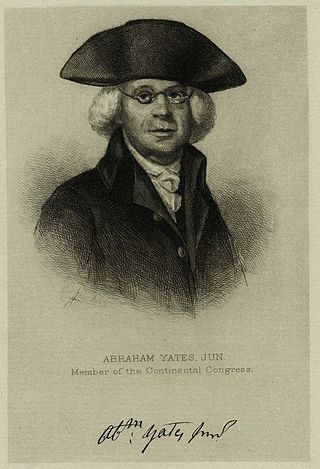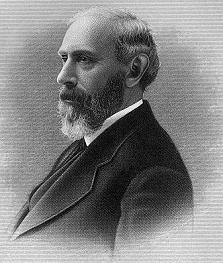
James Gore King was an American businessman and Whig Party politician who represented New Jersey's 5th congressional district in the United States House of Representatives for one term from 1849 to 1851.

Abraham Yates Jr. was an American lawyer, civil servant, and pamphleteer from Albany, New York.
Egbert Ten Eyck was an American lawyer and politician from New York. In the mid-1820s, he served parts of two terms in the U.S. House of Representatives.
Abraham Maus Schermerhorn was the third mayor of Rochester, New York and a United States Representative from New York.

Mace Moulton was an American sheriff, banker and Democratic politician in the U.S. State of New Hampshire. He served as a United States representative from New Hampshire and as sheriff of Hillsborough County during the 1800s.
Archibald Ladley Linn was a U.S. Representative from New York.

Charles Stephen Millington was an American politician and banker from New York. He served as a U.S. Representative from 1909 to 1911.

Gerrit Yates Lansing was an American lawyer and politician who served three terms as a U.S. Representative from New York from 1831 to 1837.

John Isaac De Graff was an American businessman and politician who served two non-consecutive term as a U.S. Representative from New York 1827 to 1829, and again from 1837 to 1839.

Robert Hewson Pruyn was an American lawyer, militia general, diplomat, and politician from Albany, New York. He was most notable for his service as Speaker of the New York State Assembly, Adjutant General of New York, and United States Minister Resident to Japan.
Evert Bancker was an American trader and politician who was Mayor of Albany from 1695 to 1696 and from 1707 to 1709.

Robert Clarence Pruyn was an American inventor, banker, businessman, and politician.
John T. Hudson was an American lawyer and politician from New York.

The Ten Eyck family came from the Netherlands to New Amsterdam in the 1630s. The patriarch of the American branch of the family was Coenraedt Ten Eyck, who was originally from Moers. His son Jacob moved to Albany where he was a silversmith. Several family members gained land, wealth and positions of power in Albany, New York City and New Jersey. Their descendants served as Albany Mayor, New York State Senator, U.S. Representatives from New York, and U.S. Senator from New Jersey. The Ten Eycks also formed several businesses, including the Ten Eyck hotel and the Ten Eyck insurance group.
Colonel Kiliaen van Rensselaer was a colonial American soldier and politician who was a member of the prominent Van Rensselaer family.
Frederick Van Cortlandt was an American merchant and landowner.
Jacob Coenraedt Ten Eyck was an American lawyer and politician from New York.

Richard Irvin was a Scottish-American merchant and banker who served as the president of the Saint Andrew's Society of the State of New York.
Johannes "John" Jacobse Beekman was a New York politician and businessman of Dutch descent. He served as Mayor of Albany, New York and a member of the New York State Assembly.
James Morris was an American lawyer who served as Sheriff of New York County.










